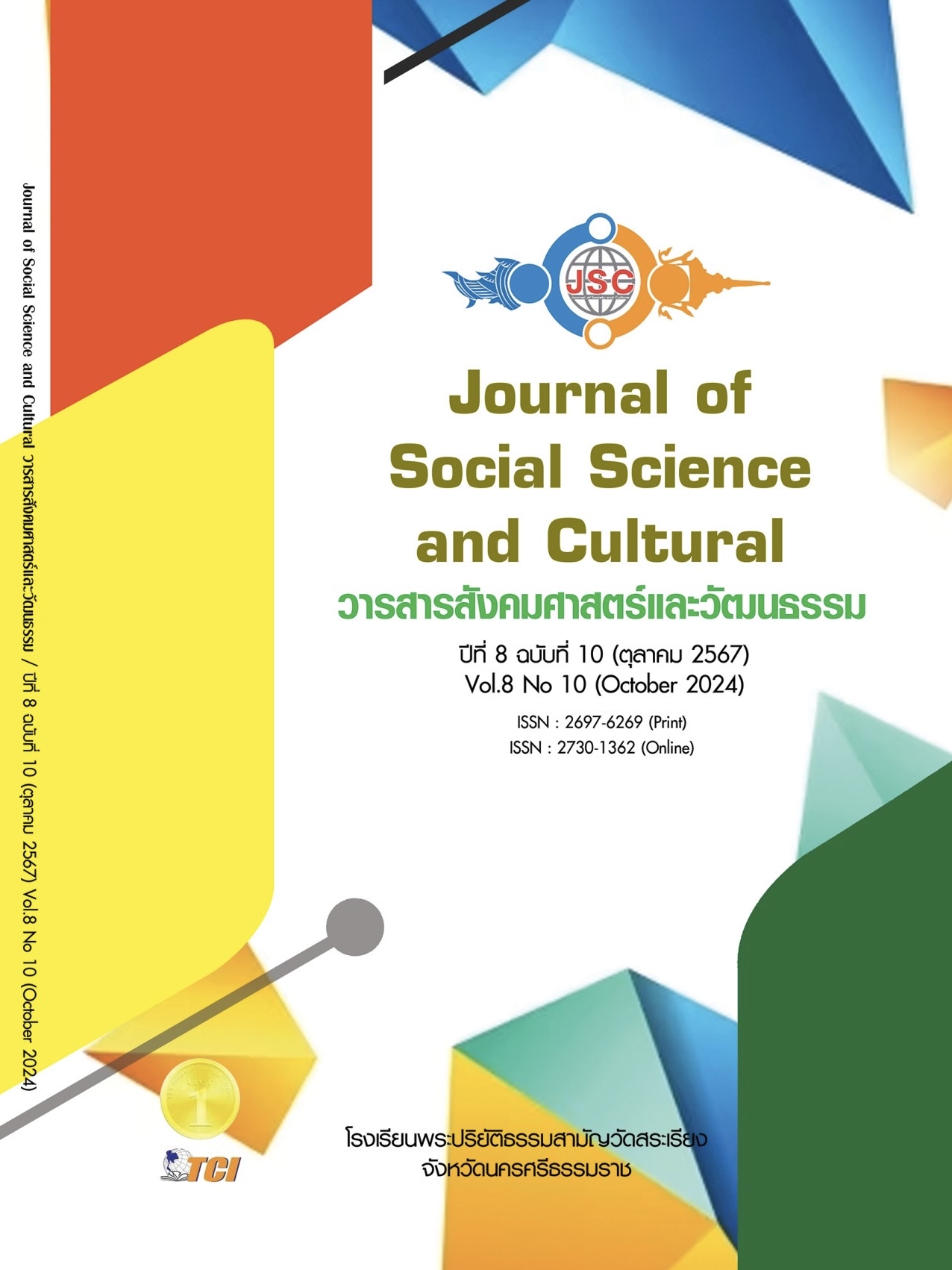INTEGRATION OF BUDDHIST PRINCIPLES TO PROMOTE POLITICAL COMMUNICATION FOR LOEI PEOPLE
Main Article Content
Abstract
This research article aims to 1) To study the form of political communication for the people 2) Analyze the political communication process for the people and 3) Present a model for integrating Buddhist principles to promote political communication for Loei people, which is a combined research method. Important informants include a group of academics in Buddhism and political science. mass media group Group of members of the House of Representatives or experts and 28 local leaders specifically selected. Quantitative research The sample group consisted of 400 people who had the right to vote in Loei Province, aged 18 years and over, using a simple random sampling method. Research tools included structured interviews and questionnaires. Collect research data with an interview and distribute questionnaires. Research statistics and data analysis include mean and standard deviation. The results of the research found that: 1) General conditions of communication formats Politics for the people of Loei Province is 1.1) Knowing and understanding the principles of sending messages, 1.2) Knowing how to understand information content, 1.3) Knowing how to use various media or channels, and 1.4) Knowing, thinking, analyzing, and discerning critically. 2) The political communication process for the people of Loei Province is at a high level with an average of 3.75. When considering each aspect, it was found that the receiver side has the highest level of opinion, with an average of 3.84. In the media or channel area, it has an average of 3.81. In the message area, it has an average of 3.72 in the messenger side, it has an average of 3.61, respectively, and 3) They are integrating Buddhist principles to promote political communication for the people of Loei Province. According to the principles of Sangha Vatthu 4, it consists of 3.1) Dāna (giving), 3.2) Piyavācā (loving speech), 3.3) Atthacariya (beneficial conduct), and 3.4) Samānatta (constant self-conduct).
Article Details
References
กรีฑา คงพยัคฆ์. (2563). การประยุกต์ใช้หลักสังคหวัตถุธรรมในการให้บริการสาธารณะของเทศบาลตำบลจันดี อำเภอฉวาง จังหวัดนครศรีธรรมราช. วารสารสังคมศาสตร์และมานุษยวิทยาเชิงพุทธ, 5(1), 29-41.
กาญจนา แก้วเทพ. (2547). สื่อสารมวลชน: ทฟษฎีและแนวทางการศึกษา. กรุงเทพมหานคร: ซีเอ็ดยูเคชั่น.
จุฑาพล เมตตาสัตย์. (2556). การสื่อสารทางการเมืองผ่านการตลาดทางการเมือง ของนายชูวิทย์ กมลวิศิษฏ์: ศึกษากรณีการรณรงค์หาเสียงเลือกตั้งสมาชิกสภาผู้แทนราษฎร เมื่อวันที่ 3 กรกฎาคม 2554. ใน ดุษฎีนิพนธ์ปรัชญาดุษฎีบัณฑิต สาชาวิชาสื่อสารการเมือง. มหาวิทยาลัยเกริก.
ชัยนัท สุขไชยะ. (2562). การสื่อสารทางการเมืองไทยผ่านสื่อสังคมออนไลน์ กรณีศึกษาเฟซบุ๊กเพจ SUTHEP THAUGSUBAN (สุเทพ เทือกสุบรรณ) ช่วงเวลา 31 ตุลาคม 2556 ถึง 22 พฤษภาคม 2557. วารสาร มมร วิชาการล้านนา, 8(1), 32-39.
เชือก โชติช่วย. (2560). กลยุทธ์การสื่อสารของรัฐบาลพลเอกประยุทธ์ จันทร์โอชา. วารสารรัชต์ภาคย์, 11(24), 211-223.
นิเทศ สนั่นนารี. (2561). การสื่อสารเชิงพุทธเพื่อสร้างความปรองดองในสังคม. วารสารบัณฑิตศึกษามหาจุฬาขอนแก่น, 5(1), 159-178.
พระครูธรรมธรบุญเที่ยง พุทฺธสาวโก (ลักษณ์พลวงค์). (2564). การบูรณาการหลักพุทธธรรมกับการสื่อสารทางการเมืองเพื่อเสริมสร้างความสมานฉันท์. ดุษฎีนิพนธ์ปรัชญาดุษฎีบัณฑิต สาขาวิชารัฐศาสตร์, มหาวิทยาลัยมหาจุฬาลงกรณราชวิทยาลัย.
ยุทธ ไกยวรรณ์. (2550). วิเคราะห์ข้อมูลวิจัย 1. กรุงเทพมหานคร: ศูนย์สื่อเสริมกรุงเทพ.
ลิขิต ธีรเวคิน. (2560). ครู การเมือง ความคิด ชีวิต และผลงาน ของ ศ.ดร.ลิขิต ธีรเวคิน. กรุงเทพมหานคร: โรงพิมพ์มหาวิทยาลัยธรรมศาสตร์.
สงุ่น ตรีสุขี. (2559). การบูรณาการหลักสังคหวัตถุกับการบริหารการประปานครหลวง ภาค 1. ใน ดุษฎีนิพนธ์พุทธศาสตร์ดุษฎีบัณฑิต สาขาพระพุทธศาสนา. มหาวิยาลัยมหาจุฬาลงกรณราชวิทยาลัย.
สุดารัตน์ เกยุราพันธุ์. (2561). พุทธวิธีเชิงบูรณาการแก้ปัญหาความขัดแย้งในการเมืองไทยปัจจุบัน. วารสารบัณฑิตศึกษาปริทรรศน์, 14(2), 66-67.
สุมาลี บุญเรือง. (2562). สภาพทั่วไปและปัญหาอุปสรรคการตื่นตัวทางการเมืองของประชาชนในระบอบประชาธิปไตยที่มีผลต่อการเลือกตั้งทั่วไป. วารสารวิชาการรัฐศาสตร์และรัฐประศาสนศาสตร์, 4(3), 61-74.
สุรพล สุยะพรหม. (2562). การสื่อสารทางการเมืองของพระเทพปฏิภาณวาที (เจ้าคุณพิพิธ): ศึกษาในช่วงเวลา พ.ศ. 2540 - 2560. ใน ดุษฎีนิพนธ์ปรัชญาดุษฎีบัณฑิต สาขาวิชาสื่อสารการเมือง. มหาวิทยาลัยเกริก.


